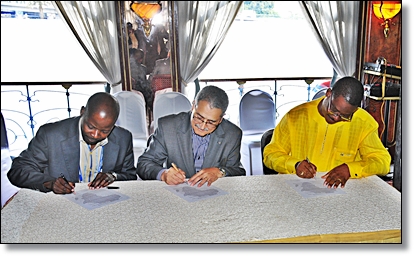IREN Signs M.O.U to Promote Twinning of African Cities
 |
|
From L-R James Shikwati (President, Eastern Africa Sister Cities; Boubker Mazoz (President and Founder, Sister Cities Africa) and Prince Kwame Kludjeson (President Chair, Africa Global Sister Cities Foundation). |
SUBJECT: MEMORANDUM OF UNDERSTANDING BETWEEN AFRICA GLOBAL SISTER CITIES FOUNDATION, SISTER CITIES AFRICA AND EASTERN AFRICA SISTER CITIES
Inter Region Economic Network (IREN Kenya) was on August 1, 2011 appointed by Sister Cities International to coordinate and establish the Eastern Africa Sister Cities organization. On September 9, 2011 aboard a cruise boat on the Nile in Cairo, IREN signed an M.O.U with the Sister Cities Africa (based in Morocco) and the Global Sister Cities Foundation (based in Ghana) to work together to promote city twinning in Africa and enhance the South to South relationship. The signing ceremony was witnessed by leaders of international twinning organizations from 30 nations hosted by Sister Cities International during the just concluded First Global Sister Cities and Twinning Summit in Cairo, Egypt.
Eastern Africa was represented by the president of Eastern Africa Sister Cities Mr. James Shikwati while Africa Global Sister Cities Foundation was represented by president and Prince Kwame Kludjeson (West Africa), and Sister Cities Africa was represented by Mr.Boubker Mazoz the president of Sister Cities Africa (Northern Africa).
The M.O.U seeks to promote cultural understanding, training, and development of youth, student exchange programs and new initiatives to nurture economic, social, and cultural relationships. The venture will see official visits between representatives from each region, including but not limited to civic, religious, business, academic, and government officials in order to promote mutual understanding, peace, and prosperity among their citizens.
According to Boubker Mazoz, the president and founder of Sister Cities Africa, the continent ought to wean itself from aid dependency. “We need a win-win situation, it should be up to us to decide what we need and decide over our priorities not just receive funding from other nations,” said Mr. Mazoz.
James Shikwati, president of Eastern Africa Sister Cities said that the partnership will benefit the newly formed Kenyan County governments, East Africa Community, Africa and the quest for better international relations. “This is a great opportunity for Africans to connect at a people-to-people level to promote their research work, arts, music, foods, promote trade and regional integration. When cities link up formally, it helps in conflict resolution and peace building; it also provides an avenue to prevent episodes of famine since food shortage signals will be picked up instantly;” Mr. Shikwati observed.
About the Inter Region Economic Network (IREN Kenya)
IREN Kenya is a leading independent African think tank that promotes ideas and strategies geared towards causing prosperity in Africa through free enterprise and sound public policy. IREN’s key focus areas include targeted events, trainings, research, consultancy, communication and its flagship online magazine, The African Executive published in English every Wednesday.
About Sister Cities International
Sister Cities International founded in 1956 by U.S.A President Dwight D. Eisenhower is a nonprofit citizen diplomacy network that creates and strengthens partnerships between U.S.A and international communities. They strive to build global cooperation at the municipal level, promote cultural understanding and stimulate economic development. Sister Cities International is a leader for local community development and volunteer action. They motivate and empower private citizens, municipal officials and business leaders to conduct long-term sister city programs. They believe that sister city programs involve two-way communication and should mutually benefit partnering communities.
